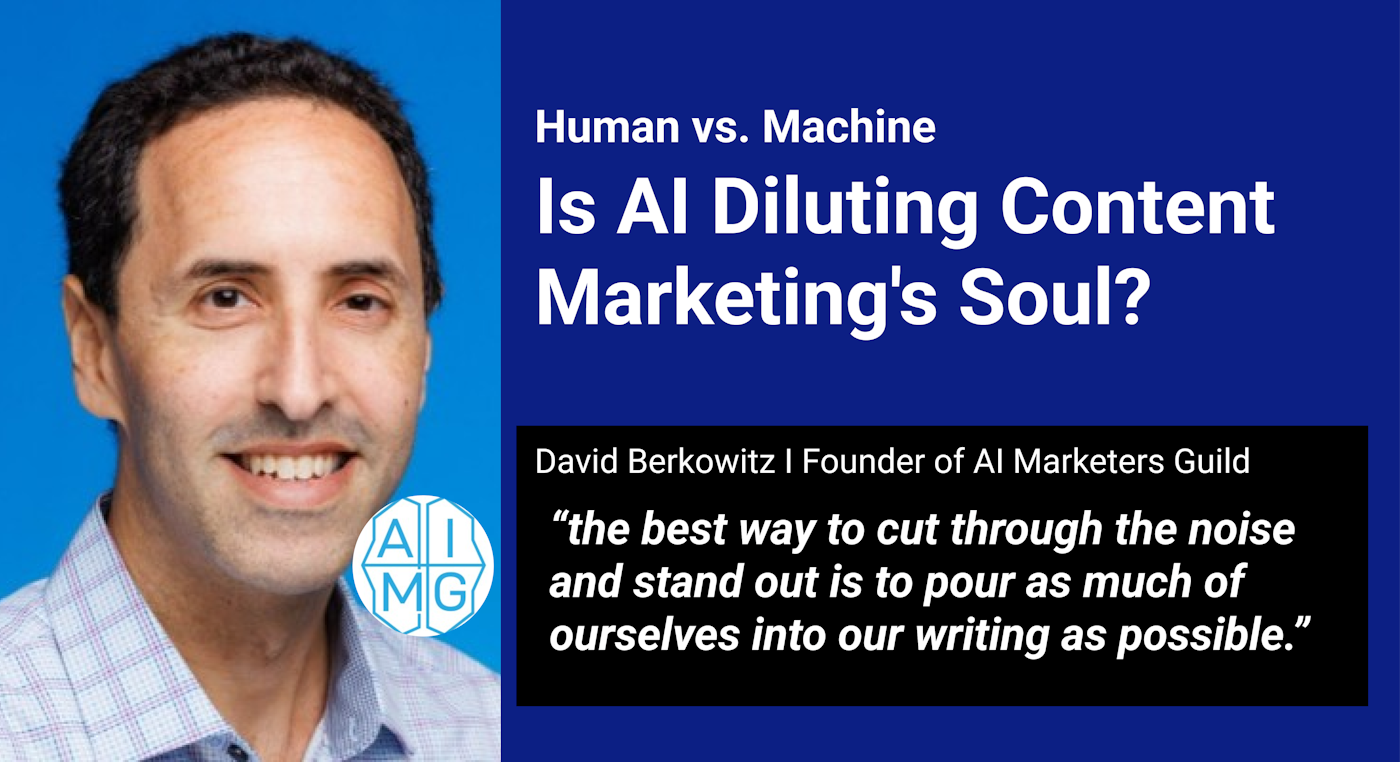Human vs. Machine: Is AI Diluting Content Marketing's Soul?
Content marketing has transformed over time from basic market shouts to intricate digital narratives. As artificial intelligence (AI) enters this space, a critical question arises: can machines maintain the heartfelt connection that is at the core of impactful content marketing? We'll explore the authenticity debate, consider the efficiency paradox versus emotional resonance, and find a way to integrate AI without losing the creative spirit that brands rely on. In the age of machine learning, it's essential to balance the speed of technology with the timeless art of human storytelling, to ensure that the narrative heart of content marketing continues to beat strongly.
The Authenticity Debate
Authenticity in content marketing is the very foundation that connects a brand with its audience. When we talk about content that resonates, we're referring to stories that stir emotions, experiences that people can relate to, and narratives that are unmistakably human. But as AI-generated content becomes more prevalent, the question arises: can it match the depth of human experience necessary to truly engage an audience?
"I've got my own unique identity, but how can you be sure that what you’re hearing isn’t just the work of a digital twin or some AI clone?"
AI content generation is impressive in its technical capabilities. Algorithms can analyze vast amounts of data to produce content that is often grammatically flawless and on-topic. However, AI lacks the lived experiences that bring true authenticity to storytelling. It can simulate empathy and emotion to a certain degree, but can it genuinely connect with readers on a deeper level? Let's consider a study where AI-generated content was preferred over human-crafted narratives. According to an MIT study, humans rated AI content as superior. Yet, as Nick Rizzo, Customer Success at Captain, puts it, "It really boils down to whether you're doing more fact-based, informative, kind of black and white, cold marketing, or if you're aiming to tap into people's emotions and make them feel different things." This sentiment is echoed in the trenches of everyday content consumption, where the nuances of human emotion and experience are paramount.
Real-world examples of AI-generated content often illustrate a gap in emotional depth compared to human-crafted narratives. While AI can churn out a well-structured article, it may struggle to invoke the emotional response a human writer can elicit through personal anecdotes and a distinctive voice. It's not just about stringing sentences together; it's about weaving experiences that AI, as of yet, cannot replicate.
The Efficiency Paradox
The allure of AI in content marketing lies in its ability to produce content at scale efficiently. Marketers are understandably drawn to the promise of AI, as it can drastically reduce the time and resources needed to generate content. However, this efficiency comes with a caveat - the risk of sacrificing the quality and depth that only human creativity can provide.
When we prioritize efficiency over depth, we risk losing the essence of what makes content engaging. As we've seen, a significant 54% of organizations use generative AI for content creation, and while 58% of marketers report increased performance, we must ask at what cost? Does the content still carry the same weight, or has it become a shadow of what it could be with a human touch?
To maintain balance, we need to leverage AI as a tool to augment human creativity, not replace it. AI can handle the heavy lifting of data processing and basic content generation, but the human element is crucial for adding the depth and flair that captivates audiences. It's a partnership, where AI provides the canvas, and humans paint the masterpiece.
Emotional Resonance and Brand Identity
A brand's soul is crafted through the stories it tells and the emotions it evokes. Emotional resonance isn't just a component of content marketing; it's what binds a brand to its audience. But can AI understand and replicate the complex emotional cues that are essential for fostering brand loyalty?
AI struggles with the subtleties of human emotion. It operates on logic and patterns, which can result in content that feels hollow or misses the mark. As Denys Kravchenko, CTO at Captain, points out, "AI can help small businesses unlock valuable marketing channels that weren't available to them before. AI-generated content might, so to speak, be diluting the marketing soul when it comes to evoking feelings." This highlights the importance of preserving the human element in brand storytelling.
By using AI as a supportive tool rather than the sole content creator, marketers can ensure that the emotional core of their brand's narrative remains intact. It's about striking a balance where AI-generated insights and efficiencies complement the nuanced, human-driven stories that build lasting connections with the audience.
Integration Without Dilution
The challenge facing content marketers is not whether to use AI, but how to integrate it in a way that doesn't dilute the creative process. AI can be a powerful ally in the content creation workflow, offering a collaborative approach to creativity that enhances rather than eclipses human input.
"The best way to cut through the noise and stand out is to pour as much of ourselves into our writing as possible. You've got to give it your all and infuse your work with your essence, so it's unmistakably yours."
Learning from the data AI provides is key to informing human-driven content creation. By analyzing audience engagement and behavior, AI can offer insights that humans can then translate into compelling narratives. This data-driven approach can result in deeper audience engagement and more impactful content.
As we look to content marketing's evolution, it's clear that AI will play a significant role. However, it's also evident that human ingenuity will remain at the forefront. As David Berkowitz, Founder of AI Marketers Guild, suggests, we should "develop and hone our own voices" to ensure content remains unmistakably ours. By providing AI with the right inputs - research, data, and human commentary - we can leverage its capabilities to craft stories that are rich, valuable, and engaging.
The Heart of Content Marketing: Finding Harmony Between Human Touch and AI Efficiency
The entrance of AI into content marketing has sparked an authenticity debate, questioning whether AI can sustain the emotional connection at the core of impactful storytelling. While AI brings an unparalleled efficiency to content creation, it lacks the human experiences and emotions that resonate deeply with audiences. The data shows a growing reliance on AI, but the emotional resonance and brand identity crucial for lasting connections remain a distinctly human domain. The challenge isn't to choose between human and machine but to integrate AI in a way that supports, not supplants, human creativity.
We're at a crossroads where the speed of AI meets the art of human storytelling. As we utilize AI's capabilities, we must remember that it's the human element that infuses our brand's narrative with color. Let's use AI as a collaborative tool, enhancing our creative processes without erasing the soul that defines our content. The future of content marketing will be shaped by those who strike this balance, creating stories that are efficient yet imbued with sincerity and authenticity. The key is not to allow AI to narrate our tales, but to narrate them with greater finesse using AI as our tool. Our audience seeks more than content; they yearn for connection, and that's a language only the human heart truly speaks.
From the Experts

"Okay, so is AI diluting the soul of content marketing? I think the answer here really depends on the type of marketing you're doing. This is definitely a concern if your marketing plays on people's emotions, trying to evoke certain feelings. There's a risk that AI-generated content might fall flat or even hit the wrong note, turning people off and causing a negative reaction. On the other side of the coin, if your marketing aims to be informative and educational, then AI is a game-changer. It can do so much more than a human in that respect. So, there are definite advantages. It really boils down to whether you're doing more fact-based, informative, kind of black and white, cold marketing, or if you're aiming to tap into people's emotions and make them feel different things. I'm not sure AI is the best at making people feel things."

"From the standpoint of a small business, AI is truly democratizing access to advanced capabilities like content generation. This technology allows small businesses to create content that's data-driven, targeted, and optimized for engagement without needing a lot of human resources or specialized expertise. In the past, small businesses often struggled to keep up with the content marketing output of bigger companies. But now, AI is empowering them to produce content at a level of quality and quantity that can compete. I believe AI can help small businesses unlock valuable marketing channels that weren't available to them before. Sure, it might be diluting the marketing soul, so to speak, but it's also opening up so many capabilities for so many people and businesses. And that's why I think it's worth it. The level of personalization AI provides was once only something big businesses with deep resources could do. But AI is making that accessible for small businesses too. The key is to find the right balance between the efficiency of AI and the authenticity of human creativity. We need to build customer trust while driving meaningful engagement through content."






